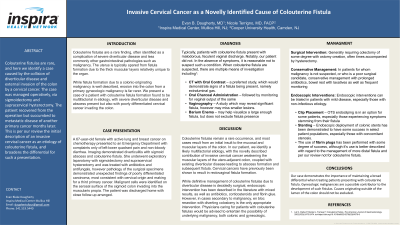Sunday Poster Session
Category: Colon
P0355 - Invasive Cervical Cancer as a Novelly Identified Cause of Colouterine Fistula
Sunday, October 27, 2024
3:30 PM - 7:00 PM ET
Location: Exhibit Hall E

Has Audio

Evan B. Daugherty, MD
Inspira Health Center
Cherry Hill, NJ
Presenting Author(s)
Evan B. Daugherty, MD1, Nicole Terrigno, MD2
1Inspira Health Center, Cherry Hill, NJ; 2Cooper University Health Care, Mullica Hill, NJ
Introduction: Colouterine fistulas are a rare finding, often identified as a complication of severe diverticular disease and less commonly other gastrointestinal pathologies such as malignancy. The uterus is typically spared from fistula formation due to the thick muscular layers relatively unique to the organ. While fistula formation due to a colonic-originating malignancy is well described, erosion into the colon from a primary gynecologic malignancy is far rarer. We present a case of a patient with colouterine fistula formation found to be multifactorial in etiology, with severe diverticular disease and abscess present but also with poorly differentiated cervical cancer invading the colon.
Case Description/Methods: A 67-year-old female with active lung and breast cancer on chemotherapy presented to an Emergency Department with complaints only of left-lower quadrant pain and non-bloody diarrhea. Imaging demonstrated diverticulitis with sigmoid abscess and colouterine fistula. She underwent exploratory laparotomy with sigmoidectomy and supracervical hysterectomy and was treated with antibiotics and antifungals, however pathology of the surgical specimens demonstrated unexpected findings of poorly differentiated carcinoma, most consistent with cervical origin and making for a third primary cancer. Malignant cells were identified on the serosal surface of the sigmoid colon invading into the muscularis propia. The patient was discharged home with close follow-up arranged.
Discussion: Colouterine fistulas remain a rare occurrence, and most cases result from an initial insult to the mucosal and muscular layers of the colon. In our patient, we identify a likely multifactorial etiology, with the novelly described contribution of invasive cervical cancer weakening the muscular layers of the utero-adjacent colon, coupled with existing diverticular disease leading to abscess formation and subsequent fistula. Cervical cancers have previously been shown to result in rectovaginal fistula formation. While definative management of colouterine fistulas due to diverticular disease is decidedly surgical, endoscopic intervention has been described in the literature with mixed results, as well as antibiotics, corticosteroids and fibrin glue. However, in cases secondary to malignancy, en bloc resection with diverting colostomy is the only appropriate intervention. Physicians caring for patients with colouterine fistulas would be advised to entertain the possibility of underlying malignancy, both colonic and gynecologic.
Disclosures:
Evan B. Daugherty, MD1, Nicole Terrigno, MD2. P0355 - Invasive Cervical Cancer as a Novelly Identified Cause of Colouterine Fistula, ACG 2024 Annual Scientific Meeting Abstracts. Philadelphia, PA: American College of Gastroenterology.
1Inspira Health Center, Cherry Hill, NJ; 2Cooper University Health Care, Mullica Hill, NJ
Introduction: Colouterine fistulas are a rare finding, often identified as a complication of severe diverticular disease and less commonly other gastrointestinal pathologies such as malignancy. The uterus is typically spared from fistula formation due to the thick muscular layers relatively unique to the organ. While fistula formation due to a colonic-originating malignancy is well described, erosion into the colon from a primary gynecologic malignancy is far rarer. We present a case of a patient with colouterine fistula formation found to be multifactorial in etiology, with severe diverticular disease and abscess present but also with poorly differentiated cervical cancer invading the colon.
Case Description/Methods: A 67-year-old female with active lung and breast cancer on chemotherapy presented to an Emergency Department with complaints only of left-lower quadrant pain and non-bloody diarrhea. Imaging demonstrated diverticulitis with sigmoid abscess and colouterine fistula. She underwent exploratory laparotomy with sigmoidectomy and supracervical hysterectomy and was treated with antibiotics and antifungals, however pathology of the surgical specimens demonstrated unexpected findings of poorly differentiated carcinoma, most consistent with cervical origin and making for a third primary cancer. Malignant cells were identified on the serosal surface of the sigmoid colon invading into the muscularis propia. The patient was discharged home with close follow-up arranged.
Discussion: Colouterine fistulas remain a rare occurrence, and most cases result from an initial insult to the mucosal and muscular layers of the colon. In our patient, we identify a likely multifactorial etiology, with the novelly described contribution of invasive cervical cancer weakening the muscular layers of the utero-adjacent colon, coupled with existing diverticular disease leading to abscess formation and subsequent fistula. Cervical cancers have previously been shown to result in rectovaginal fistula formation. While definative management of colouterine fistulas due to diverticular disease is decidedly surgical, endoscopic intervention has been described in the literature with mixed results, as well as antibiotics, corticosteroids and fibrin glue. However, in cases secondary to malignancy, en bloc resection with diverting colostomy is the only appropriate intervention. Physicians caring for patients with colouterine fistulas would be advised to entertain the possibility of underlying malignancy, both colonic and gynecologic.
Disclosures:
Evan Daugherty indicated no relevant financial relationships.
Nicole Terrigno indicated no relevant financial relationships.
Evan B. Daugherty, MD1, Nicole Terrigno, MD2. P0355 - Invasive Cervical Cancer as a Novelly Identified Cause of Colouterine Fistula, ACG 2024 Annual Scientific Meeting Abstracts. Philadelphia, PA: American College of Gastroenterology.
